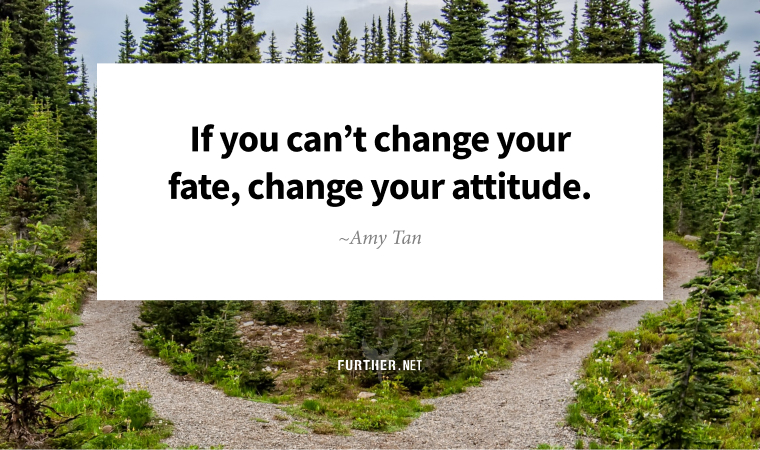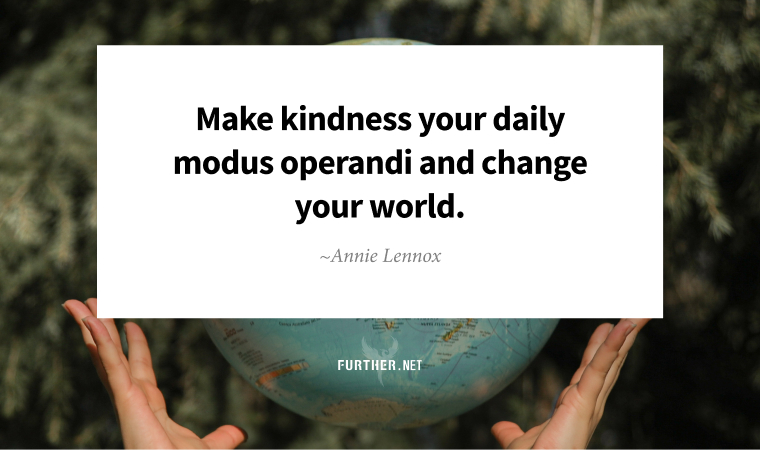How to Silence Your Inner Ageist 
When I was a kid, my mom took me to see Joan Rivers perform. I'll never forget watching a sea of adults giggling uncontrollably at her most offensive lines (and their own discomfort) and Rivers scolding them, saying: Oh, grow up! Today, I've adopted Rivers' catchphrase as my clapback when my inner critic pipes up. That voice in our heads will never stop nattering because we come wired with it — it's like an amygdala-controlled Alexa with no off-button. The stress response is there to keep you "safe," but really, it's a habituated reaction to past experiences and beliefs. Naturally, this means your mind is often your most eager saboteur when you're growing and changing. At midlife, one of our brain's most common refrains is some variation of: You're too old. Thinking about going solo and starting your own business? Too late. Want to go back to school to upskill? You were never a great student; what makes you think you can start now? Aiming to stay rad in your 50s (and beyond)? Who says rad over 12 years old? Act your age! The list goes on and includes every topic we cover here at Further, as we're dedicated to helping you live your best life at midlife. Your brain, on the other hand, has some firmly entrenched ageist attitudes. And not just your mind — everyones'. Witness Becca Levy, PhD, who literally wrote the book on shifting your beliefs about aging to live longer and better. In Breaking the Age Code, she tells a story about running a 5K without stretching and badly pulling a muscle. It took her teenage daughter to point out that anyone, at any age, under those conditions, would've gotten injured. As Dr. Levy recounts: I had instinctively attributed my injury to something other than skipping a warm-up. Instead, I had blamed my age: my mind had made connections that I don't consciously believe — that your body falls apart as you age. The truth is you can do much more than you think you can. The trick is to shush that inner ageist so you can keep going. Here are a few proven ways to stop negative, biased thinking: - Accept that you are not your thoughts: The story in your head is just that — a story. There are many proven ways to befriend your brain and quiet your inner critic, such as meditation.
- Stop playing the "compare and despair" game: This can be challenging in the age of social media. But take it from Warren Buffet: you'll win by using an "inner scorecard," where you focus on incremental improvements for your own sake — nobody else's.
- Practice self-compassion: Pause when you mess up to consider if you'd speak to a friend the way you're scolding yourself. And use curiosity, comforting self-touch, and positive action, like wishing to accept all parts of yourself, to move forward.
- Celebrate achievements: Acknowledging wins, no matter how small, is a great way to bolster your emotional well-being and counteract the Debbie Downer/Bob Bummer in your mind.
- Shift your perspective: How do you start seeing things differently, in a way your inner critic can't compete with? You broaden your horizons by questioning your limiting beliefs. We meditation teachers call this "correcting the intellect," which you're already doing by consuming Further's personal growth content. Look for books, newsletters, podcasts, and other resources that help you evolve past perspectives that no longer serve you.
Your inner ageist doesn't want you to outgrow its words of "wisdom." But you're old enough to know better: the only way to silence a critic is to stop paying attention to its lousy reviews. Further exploration: In addition to all the links to Further articles above 👆 Breaking the Age Code: How Your Beliefs About Aging Determine How Long and Well You Live by Becca Levy, PhD Longevity Gains newsletter: An excellent resource from Brian for marketers and entrepreneurs that sheds light on where many of our societal views about aging come from, plus how to break free of the old ways. Wiser Than Me podcast with Julia Louis-Dreyfus: Listening to accomplished people like Jane Fonda, Isabel Allende, and Amy Tan, who are no strangers to critics (external and internal) inspires great ideas for how to live a full, meaningful life. Keep going- Trudi Roth P.S. New to Further? Join us here. Semi-Charmed Life If retirement seems like something you won't be able to afford financially, emotionally, or socially, join the club. And stop fretting — more and more people are choosing to scale back but not stop working, aka semi-retirement. Along with a continued income stream, semi-retirees find loads of benefits, including a sense of purpose, flexibility, and ongoing learning. In other words, all you need to lead a full life. Semi-Retirees Know the Key to Work-Life Balance (The Atlantic) Blaze a Trail Hiking is excellent for your physical and mental health, so it's no wonder it's one of the hottest forms of fitness today, with 59 million Americans hitting the trail, according to the Outdoor Foundation. While you don't need to be a rugged outdoors person to enjoy a half-day hike, it does help to plan ahead so you don't get lost, injured, or stuck without the right supplies. Hiking Has All the Benefits of Walking and More. Here's How to Get Started (New York Times) The Rachel 5.0 Even though I only dreamed there was a Friends episode called "The One Where Rachel Went Gray," IRL Jennifer Anniston really did flaunt her silver roots and reassured us: "I think everyone should feel confident in whatever choices they make, including embracing natural color or texture." Now that's a good friend. Jennifer Aniston Embraced Her Gray Roots, and We're Very Much Here for It (Self) Smart Food We've touted the benefits of a Mediterranean diet time and again here at Further, and now there's new evidence from the Ben-Gurion University of the Negev that the greens-focused Blue Zone approach is an excellent way to preserve your gray matter. Greener Diet, Younger Brain: Mediterranean Diet Slows Brain Aging (Neuroscience News) The Surprising Health Benefits of Random Acts of Kindness 
By Trudi Roth Over the past few years, the world has become particularly cruel (and not to be kind) thanks to the global pandemic, societal turmoil, and political divisiveness, among other nastiness. It's no coincidence, then, that popular TV shows like Ted Lasso suggest it's time to bring human kindness back en vogue. While that's a nice idea, making daily random acts of kindness a priority might seem frivolous, especially if you're one of the millions grappling with depression or anxiety — one of the most common mental health disorders, affecting one in three adults. But now, new research indicates that being altruistic can be as beneficial to the person who's making the effort as it is to the recipient. And best of all, science shows a little thoughtfulness goes a long way. The Good Thing About Kindness There's a lot of empirical evidence that links generosity with health. From lower blood pressure to a stronger immune system and boosted serotonin and dopamine (the "happy hormones"), kindness is not just a moral value but also a vital component of physical and mental well-being. In a new study conducted by Ohio State University's psychology department, researchers tested the efficacy of a traditional cognitive behavioral therapy technique (keeping a "thoughts" journal), planning social activities, and performing random acts of kindness as ways to address anxiety or depressive symptoms. The results surprised researchers, as the study's co-author Jennifer Cheavens said: We did think that, if there was going to be an advantage of one group over another, it might be the thoughts record group, since that's such a tried-and-true way of addressing depressive [and anxiety] symptoms. But the kindness group did as well or better, and that group also had increases in social connection that didn't happen in the other two groups. A simple solution that can complement therapy with no side effects! Given that the Surgeon General recently issued an advisory about the loneliness epidemic, now's the perfect time to connect in person and in charitable ways. Considerate Done So, what exactly is a "random act of kindness"? The authors of the study defined it like this: Big or small acts that benefit others or make them happy, typically at some cost to yourself in terms of time or resources. The subjects complied in a variety of ways, from buying coffee for a stranger to making cookies for friends and shoveling snow for a neighbor. Despite their own challenges, they willingly complied with acts of kindness — perhaps because it was a chance to stop ruminating on their issues and instead focus on other people. As it turns out, the social connection was the cheery on top. (Nope, that's not a typo. Hopefully, it made you smile. 😀) How Small Acts of Kindness Can Help With Anxiety (Greater Good) further: flashback  Toni Basil - Mickey 1982 Mickey may have been a one-hit wonder for Toni Basil, but it was also one of the most played videos in the early days of MTV. While the song is a modified cover of Kitty by the British pop group Racey, Basil added the legendary "Oh Mickey, you're so fine" chant that's now involuntarily lodged in your head. (YouTube)
further: sharing  Share Further with Friends and Get Access to Well + Wealthy! Share Further with friends and earn three months of access to our membership community: Well + Wealthy with only five referrals. Simply give them your unique referral link or use one of the sharing icons below. You have referred 0 people so far. | Thank you for sharing Further! | 










No comments:
Post a Comment